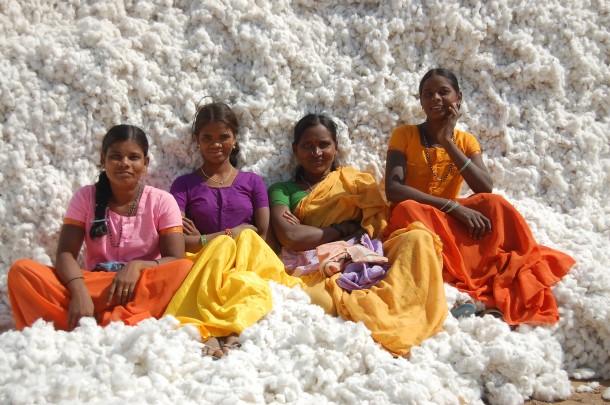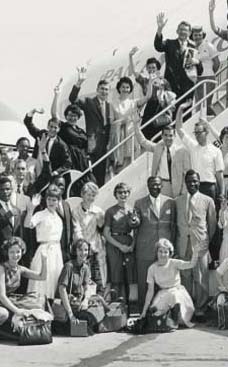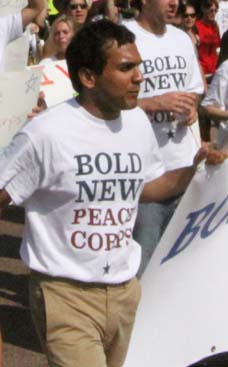
"I lived in Mali for a few years, as a Peace Corps volunteer. Living with subsistence farmers there, what I really saw, was that income is development. It's not helpful, I think, for NGOs to come in and build a health center or build a school if the farmers there are not earning more. If they can earn more for their basic crops, then they can build their own health center. That's how I first got into fair trade. Then I took a detour into manufacturing and did some work in the private sector, working for an apparel/sports wear company doing corporate social responsibility. I spend a lot of time in factories there because a lot of factory workers come from farming communities. So often in developing countries, farmers are moving to cities to try and get better jobs. So I was seeing this play out in factories and thinking about the opportunity to apply the fair trade model that has been so successful in agriculture further up the value chain to light manufacturing. Our theory is that factory workers can stand to benefit from fair trade, just as farmers have. I was recruited back early last year to launch this program. It's very exciting."
Mali RPCV Heather Franzese, is Senior Category Manager for Apparels and Linens at Fair Trade USA
Fair trade certification expands to the apparel industry
December 9th, 2010Contributors: Sarah Kuck
In time for the gift-buying season, Fair Trade USA launched a new a fair trade certification for apparel. Their other certifications, like the ubiquitous fair trade coffee, enable consumers to vote with their dollars. But up to this point, the apparel industry, though littered with workers' rights violations, had no third party fair trade certification. To learn more about evaluating a garment from cotton plant to retail store, we spoke with Heather Franzese, Senior Category Manager for Apparels and Linens at Fair Trade USA.
Dowser: What makes this certification unique?
Franzese: There's certification for organic cotton but there's actually not really any other ethical certification for clothing. Behind the scenes companies have been doing a lot of work to prove that they're not sourcing in sweat shops, but there hasn't been any communication directly to the consumer about this, or any way for the consumer, at the point of purchase, to choose a T-shirt that was made in an ethical manner over one that was made in a sweat shop. All we see in the clothes that we buy are those three little words: 'Made in China' or 'Made in Indonesia.' And that really doesn't tell you anything about the working conditions.
Our third party certification is the consumer's assurance that fair labor standards were met and that farmers and workers actually earned more. The debate has been very focused on avoiding exploitation, and we think there are actually factories that are going well beyond avoiding exploitation, but actually providing decent jobs and sustainable livelihoods and thriving communities for their workers. We're trying to recognize and reward those 'best in class' factories and reward 'best in class' cotton farmers for their sustainable productions and give consumers a way to support that.
How does the certification process work?
In this first phase of our pilot, the certification is farm to finish. On every garment that is carrying the 'Fair Trade Certified' label it means that the cotton farmers and the factory workers met fair trade standards.
We have a network of local partners in the field for all of our manufacturing and farming locations. Both the farm and the factory, as well as the middle chain suppliers, are audited against fair trade standards on a regular basis. At the factory level, we set up grievance and complaint channels so that workers can be our eyes and ears in the factory 365 day a year. We do worker training to train them on their rights and on fair trade standards and then tell them how to contact us if they think that their rights are not being upheld.
How is your work funded?
In the early stages of development, Levi's Foundation funded some of the work, and we've had some other companies contribute as well as foundation donors. Eventually, licensing fees from the use of the label will fund the program. This is the model we use for all of our products -- initial R&D for new products is funded through external grant funding and then once the program is up and running, it's funded through licensing fees. As an organization, about 30 percent of our funding comes from grants and about 70 percent from licensing fees.
Who seeks certification from you and why?
Right now, those who are most enthusiastic are smaller, mission-driven companies that have really built their brands around social and environmental responsibility. Several organic pioneers who are kind of looking to go beyond organic -- companies like Maggie's Organics and Indigenous Design -- as well as new entrepreneurs. Certainly we are talking to the ethical leaders in the more mainstream market -- companies who have really shown leadership around social responsibility in clothing -- and some of them are taking a wait-and-see approach. We'll see who is going to step up and be the first.
What types of challenges are there in setting up something like this?
One of the challenges, compared to our other products, is the apparel development timeline -- it takes so long to get a product to market [sometimes] 12-18 months. Lining up those supply chains with their product development timelines is a challenge. If a company is not committed, it's hard to make all the other things happen in the supply chain.
Would you like to see policy replace certification? Or is certification the best solution?
Definitely would be amazing to one day have government standards for this because there's a limit to what voluntary standards can do. [However], in coffee and some other products we're seeing brands move from doing fair trade as a smaller percentage of their total business to making 100 percent commitments -- companies like Ben and Jerry's making a commitment to certify 100 percent of ingredients as fair trade. That's what I'd love to see one day for clothing as well.
It seems like you make an effort to target the entire creation chain. Can you tell me about the life of a fair trade garment?
It's a complex chain that most consumers don't think about. For products with natural fibers, like cotton, it starts with the farmer. The cotton is grown and hand picked and sent to a ginner, which removes the seeds. Then it goes to a spinner to be spun into yarn, and then either to a weaver or a knitter to become fabric. Then it goes to the dye house or to the cut-and-sew operation, which is what we think about when we think about clothing -- sewing machine operators. And then they do the finishing and packaging and send it to retailers. Sometimes those steps happen in multiple countries. But in India, for example, there's a lot of vertical operations, where they do the spinning, weaving and dying under one roof and you'll have large facilities with as many as 5,000 workers doing all those different operations together.
Do most consumers know about this issue? Do you spend a lot of time on outreach?
We think that consumers are looking for an extension of fair trade into other products. If they are already drinking fair trade coffee why not also buy fair trade clothes? We do an annual market research study with Globe Scan. And one of the questions we asked in the last round was what fair trade product category would you most like to see? There were about a dozen choices and the top pick was clothing and textiles.
One of the areas that we're trying to do outreach in is with students, [who] tend to be so passionate about these issues. We just did a student video contest, and we had students from across the country submitting videos about fair trade apparel. We provided them with footage and photos and then we posted the finalists on Facebook.
What does the future look like for this certification?
We've seen our other fair trade products go mainstream. My vision is for a fair trade choice in every store, in terms of clothing. So it may not be the entirety of what a store offers, but at least the consumers have that choice. Right now the products are available online and I think it's great because consumers are willing and interested to shop online because it's hassle free, you don't even have to leave your house to buy fair trade clothing for the holiday season.
When I first started working for Fair Trade in 2002, coffee was just about the only product that we certified, and some limited tea and cocoa. And it was a very small part of the market, and we said, 'It's going to be mainstream one day!' And now we see it in outlets across the country. Fair trade products are available in over 60,000 retail locations across the country. I'm pretty confident that we can achieve that distribution for fair trade clothing one day, too.
How did you get involved with this work?
I lived in Mali for a few years, as a Peace Corps volunteer. Living with subsistence farmers there, what I really saw, was that income is development. It's not helpful, I think, for NGOs to come in and build a health center or build a school if the farmers there are not earning more. If they can earn more for their basic crops, then they can build their own health center. That's how I first got into fair trade. Then I took a detour into manufacturing and did some work in the private sector, working for an apparel/sports wear company doing corporate social responsibility. I spend a lot of time in factories there because a lot of factory workers come from farming communities. So often in developing countries, farmers are moving to cities to try and get better jobs. So I was seeing this play out in factories and thinking about the opportunity to apply the fair trade model that has been so successful in agriculture further up the value chain to light manufacturing.
Our theory is that factory workers can stand to benefit from fair trade, just as farmers have. I was recruited back early last year to launch this program. It's very exciting.
What do you like about the work you do?
I visit all the supply chains and the farms and factories that make the products, and what inspires me are the stories behind them. This certification is a mechanism to tell those stories to consumers -- and for consumers to make a connection to the people who make their clothes.
We're working with a factory in Liberia that is making T-shirts for Prana that will come out this spring. I visited that factory in May. Liberia had 13 years of civil war; they have 80 percent unemployment. And I was talking with the women who are sewing in that factory about their hopes for fair trade. They said: 'We want to have literacy classes, we want to take computer classes.' That's what inspires me to come to work every day, knowing that we're benefiting those farmers and workers.
This interview has been edited and condensed.
Photo: Fair Trade USA















